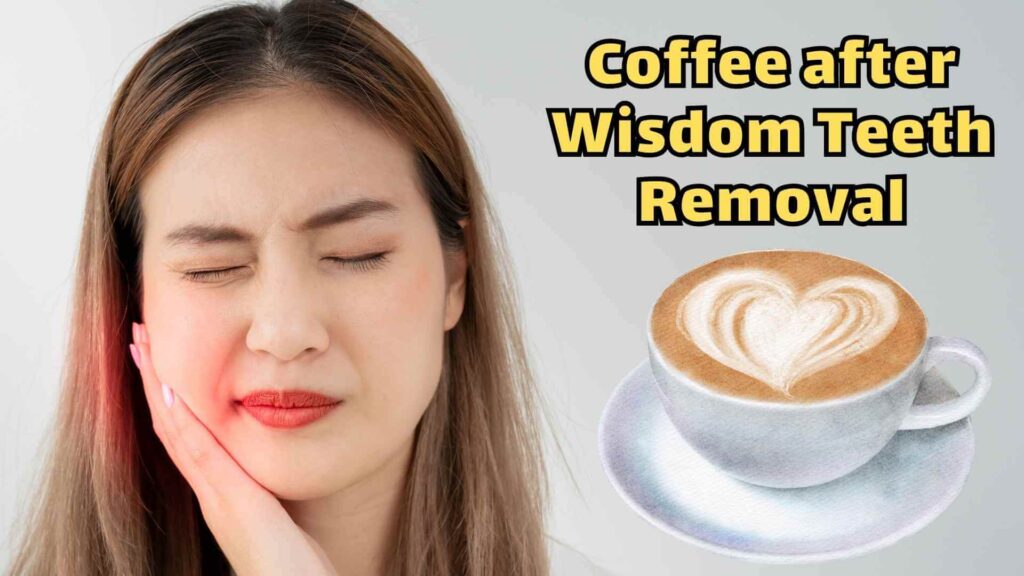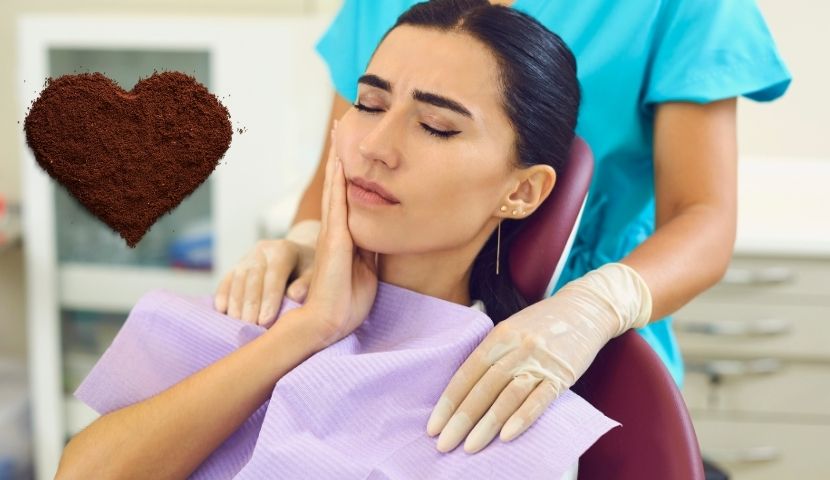If you’ve recently undergone wisdom teeth removal, you may be eagerly anticipating the moment when you can return to your daily routine, which likely includes enjoying a warm cup of coffee. But, can you drink coffee after wisdom teeth surgery, or should you hold off for a while?
It’s best to avoid drinking coffee for the first 48 hours after wisdom teeth removal to prevent complications like dry socket, and gradually reintroduce it once you’ve healed, ideally after 3-5 days.

This article will explore the safety of drinking coffee after wisdom teeth removal, provide expert recommendations, and suggest alternative beverages for your recovery.
You may like reading: https://coffeemakerusa.com/coffee-after-eating-fish/
Understanding the Healing Process After Wisdom Teeth Removal
Wisdom teeth removal is a common oral surgery performed for a variety of reasons, such as preventing future dental complications, alleviating pain caused by impacted teeth, or addressing existing problems like infections or cavities.
The recovery period after wisdom teeth removal is a critical time that requires careful attention and proper self-care to ensure a smooth healing process.
The Healing Process
When your wisdom teeth are removed, the first few days following the surgery are crucial for healing. During this period, the body begins to form a blood clot in the area where the teeth were extracted. This clot is an essential part of the healing process, as it helps protect the exposed bone and nerves. It is vital to avoid actions or substances that could dislodge this blood clot, as this can lead to complications such as dry socket.
The Impact of Coffee on Post-Surgery Recovery

1. Risk of Dry Socket
One of the most significant risks associated with drinking coffee after wisdom teeth removal is the potential development of dry socket. Dry socket occurs when the protective blood clot that forms in the extraction site becomes dislodged or dissolves too early, exposing the underlying bone and nerves. This condition can result in severe pain and delay the healing process.
Why does coffee contribute to dry socket?
Hot beverages like coffee can increase the risk of dry socket due to the suction action that occurs when you drink. When drinking from a cup or even sipping from a straw (which should be avoided after surgery), the suction can cause the blood clot to shift, thus increasing the likelihood of dislodging it.
To avoid this painful condition, it is strongly recommended to refrain from drinking hot liquids, including coffee, during the initial 48 hours of your recovery.
2. Increased Swelling and Bleeding
Caffeine, which is found in coffee, is a stimulant that can affect your body in various ways. One of its side effects is an increase in blood pressure. Elevated blood pressure can result in increased bleeding and swelling in the areas where your wisdom teeth were removed. This can make the healing process longer and more uncomfortable, which is something you want to avoid during your recovery.
The swelling in your face and gums is a natural reaction after oral surgery, but excessive swelling can delay healing and increase discomfort. Drinking coffee soon after your surgery can exacerbate this issue, prolonging the amount of time it takes for swelling to subside.
3. Delayed Healing
Consuming hot coffee may also directly affect your healing by irritating the sensitive tissues in your mouth. After oral surgery, your gums and the surrounding tissue are in a delicate state. Drinking hot beverages like coffee can cause discomfort and may further aggravate the area, slowing down the healing process.
Additionally, caffeine has a well-known effect on sleep patterns. Quality sleep is essential for recovery, and consuming caffeine too soon after surgery can interfere with your rest, hindering your body’s ability to heal effectively.
Expert Recommendations: When Is It Safe to Drink Coffee?

So, when can you safely return to your beloved coffee without compromising your recovery?
First 24–48 Hours: Avoid All Hot Beverages
The first two days after your wisdom teeth removal are the most critical. During this period, the blood clot in the extraction site is still forming and stabilizing. It’s crucial to avoid all hot beverages, including coffee, to reduce the risk of complications like dry socket.
Drinking hot liquids during this initial phase can dislodge the blood clot or irritate the surgical site, hindering the natural healing process. During this time, it’s best to stick to cool or lukewarm beverages.
After 3–5 Days: Reintroduce Coffee Gradually
After the first few days, you may begin to notice some improvement in your condition. The blood clot will be more stable, and the initial swelling will have reduced. At this point, you can start to reintroduce coffee, but it’s important to take it slow. Start with lukewarm or room-temperature coffee, and limit the amount you drink.
Avoid hot coffee during this phase, as the heat could still cause irritation or discomfort. If you notice any pain or discomfort after drinking coffee, stop consuming it and consult your dentist for advice.
After 1–2 Weeks: Return to Normal Consumption
For most individuals, the healing process progresses sufficiently within 1–2 weeks after surgery to return to normal coffee consumption. At this stage, most of the swelling will have subsided, and the extraction sites should be healing well.
However, it’s always best to check with your dentist or oral surgeon before resuming your regular coffee habits. If you have any concerns or lingering discomfort, it’s better to err on the side of caution.
Tips for Safe Coffee Consumption Post-Surgery
While it’s tempting to dive back into your usual coffee routine, here are a few tips to ensure you do so safely:
1. Avoid Using Straws
After wisdom teeth removal, it’s essential to avoid using straws to drink liquids. The suction caused by using a straw can dislodge the blood clot, leading to dry socket. Always drink coffee directly from a cup, and avoid any action that could create suction in your mouth.
2. Monitor for Discomfort
If you begin drinking coffee after your wisdom teeth surgery and notice any increased pain, swelling, or discomfort, it’s best to stop drinking it immediately. Pay attention to how your mouth feels after consuming coffee. If you experience increased sensitivity or a worsening of symptoms, consult your dentist for further advice.
3. Stay Hydrated
Adequate hydration is critical during your recovery period. While coffee is a liquid, it is also a diuretic, which can contribute to dehydration. It’s important to drink plenty of water throughout the day to support healing. Make water your primary drink during the first few days, and use coffee as a treat only once you’ve fully healed.
Alternative Beverages During Recovery

While you may need to hold off on your coffee cravings initially, there are several soothing alternatives to enjoy during your recovery that won’t interfere with your healing:
1. Herbal Teas
Herbal teas such as chamomile or peppermint are excellent choices for post-surgery recovery. These teas are naturally caffeine-free and can help soothe your sore gums. They are also gentle on the mouth and provide hydration without the risks associated with coffee.
2. Iced Coffee
Once your recovery progresses, you can consider switching to iced coffee. Since iced coffee is cool, it won’t irritate the surgical site or increase swelling. Just ensure that the coffee is not too strong or sweetened excessively, as sugar can sometimes cause discomfort in sensitive areas of the mouth.
3. Smoothies
Smoothies can be a great way to get nutrients while keeping your mouth comfortable. They can also help reduce swelling if they are packed with anti-inflammatory ingredients like berries or ginger. Just be sure to use a spoon and avoid straws!
4. Broths
Warm, not hot, broths can provide nourishment and comfort during the recovery process. They are easy to consume and can help keep you hydrated without irritating your healing tissues.

Conclusion
While it’s understandable to want to return to your regular coffee routine, it’s essential to take care during your wisdom teeth recovery. Reintroducing coffee too soon can risk complications like dry socket, delayed healing, and increased pain. Always follow the advice of your dentist or oral surgeon, avoid hot beverages in the first 48 hours, and gradually reintroduce coffee only once you’ve properly healed. In the meantime, consider alternative beverages that are both soothing and safe for your recovery.
If you have any doubts or concerns about your specific situation, don’t hesitate to reach out to your dentist for personalized advice. Healing takes time, but with the right care, you’ll be able to enjoy your coffee again soon!



0 Comments